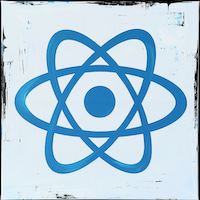
Created by Facebook and initially released in 2015, React Native builds upon the principles of ReactJS, extending its capabilities to mobile platforms.
This framework allows developers to use JavaScript and React syntax to build native mobile applications for both iOS and Android from a single codebase.
Historically, experimenting and iterating with mobile app development has been more costly and time-consuming compared to web and desktop frontend development. React Native successfully addresses these challenges by enabling developers to write code once and deploy it across multiple platforms.
This efficiency not only accelerates development timelines but also allows teams to iterate rapidly on app features and user interface designs, bridging the gap between web and mobile development practices.
iOS and Android App Development with React Native
React Native Key Points
Efficiency in Development
React Native simplifies the creation of mobile apps by facilitating code reuse across iOS and Android.Cross-Platform Compatibility
Developers leverage their existing knowledge of JavaScript and React to prototype and refine mobile applications seamlessly.Cost and Time Savings
By reducing the need for separate development teams and allowing faster iteration cycles, React Native significantly lowers the overall cost and time investment in mobile app projects.
Pros
Rapid Development Cycles
React Native facilitates quicker iterations compared to traditional native app development.Cost Efficiency
Lower development costs due to code reusability and streamlined development processes.Large Community and Support
Extensive libraries and a thriving community provide solutions and updates that enhance development speed and address common challenges.
Cons
Performance Limitations
While suitable for most applications, complex animations and high-performance requirements may necessitate native development.Access to Native APIs
Integration with specific device features and APIs may be limited compared to native development.Debugging and Optimization Challenges
Optimizing React Native apps for performance and debugging can be more complex compared to native apps.
React Native Alternatives
When considering alternatives to React Native, developers have several viable options that cater to different project needs.
Flutter
Known for its single codebase and high-performance UI rendering, Flutter uses Dart as its programming language. It has gained popularity for its fast development cycles and beautiful, native-like interfaces. However, developers proficient in Dart may be less common compared to JavaScript.
Xamarin
Xamarin, supported by Microsoft, leverages C# and .NET for native cross-platform development. It’s well-suited for enterprise applications requiring strong backend integration and offers robust tools for building high-performance apps. Nevertheless, the talent pool for Xamarin developers may be smaller compared to those for more widely adopted frameworks like React Native.
Ionic
Ionic utilizes web technologies (HTML, CSS, JavaScript) to develop hybrid apps that run on both iOS and Android. It provides a broad community and extensive plugin ecosystem, making it suitable for rapid prototyping and cross-platform deployment. However, performance benchmarks may not match those of native or other cross-platform frameworks.
React Native vs Native Development
Native development involves using platform-specific languages such as Swift/Objective-C for iOS and Kotlin/Java for Android. When comparing React Native to native development approaches, several key factors emerge due to their differing operational and integration methods with mobile platforms.
Developer Availability
Finding skilled native developers can be challenging and costly due to their specialization in platform-specific languages like Swift/Objective-C or Kotlin/Java, which are less prevalent compared to JavaScript. Native development often requires developers to specialize in either iOS or Android, limiting flexibility compared to cross-platform frameworks like React Native. This specialization can lead to higher costs and longer development timelines when building separate apps for iOS and Android platforms.
Development Speed and Iteration
React Native enables faster development cycles compared to native development by leveraging cross-platform capabilities and code reuse. Developers write code once and deploy it across both iOS and Android, accelerating the time-to-market for mobile applications.
Performance and Optimization
Native apps typically offer superior performance, particularly for graphics-intensive or real-time data processing applications, compared to React Native. Direct access to platform-specific APIs ensures optimal performance and responsiveness in native development.
Ecosystem Integration and Platform Guidelines
Native development ensures seamless integration with platform ecosystems (iOS or Android), closely adhering to platform guidelines and standards. This integration is critical for apps requiring deep system integration or compliance with specific platform features.
Cost Efficiency and Maintenance
React Native often delivers cost savings in initial development phases due to code reuse and streamlined processes. However, native development may offer long-term cost benefits in maintenance and performance optimization, particularly for complex or high-traffic applications.

React Native remains a powerful tool for modern mobile app development, offering significant advantages in rapid prototyping and cost efficiency.
While it excels in reducing development time and costs associated with mobile app experimentation, teams should evaluate specific project requirements and performance considerations when deciding between React Native and native development.
Our team has expertise in leveraging React Native for efficient mobile app development. We’re here to offer expert guidance tailored to your needs, especially for rapid prototyping on iOS and Android.
Our offer
Free Project Architecture Audit
This session lasts 2 hours and is held in small groups.
Agile Fixed Price Contract
Suitable for new development and legacy modernization projects.
We are committing to deliver the agreed-upon functionality within a budget and offer a warranty on the outcomes.
Hourly rate / „Time and Materials“
Suitable for consulting, technical supervision and smaller development projects.

React: Frontend Development
React, created by Facebook, is a top tool for front-end development.
It provides a powerful library for building dynamic web applications. Since its release in 2013, React has changed how developers build user interfaces, making it easier to create high-performing web applications with reusable components.

Clojure and ClojureScript: Frontend and Backend Development
As the software development landscape continually evolves, businesses face the challenge of selecting tools that not only meet current needs but also future-proof their operations.

Erlang/OTP and Elixir Solutions
Erlang, developed by Ericsson, is known for its concurrency, fault tolerance, and distributed computing.
This language was designed to handle massive amounts of concurrent processes efficiently, making it a go-to for applications that require high availability and reliability.

Java Spring And Spring Boot
Java Spring and Spring Boot have become the de facto standard tools in modern Java development, playing a pivotal role in simplifying application development and maintenance.
These frameworks empower development teams with efficient processes that significantly enhance flexibility and scalability, making them essential for managing the complexities of enterprise-level applications.

RabbitMQ Applications: Spring Boot (Java)
Integrating RabbitMQ with Spring Boot significantly enhances Java application scalability, offering developers a robust framework for efficient message handling and microservices architecture.